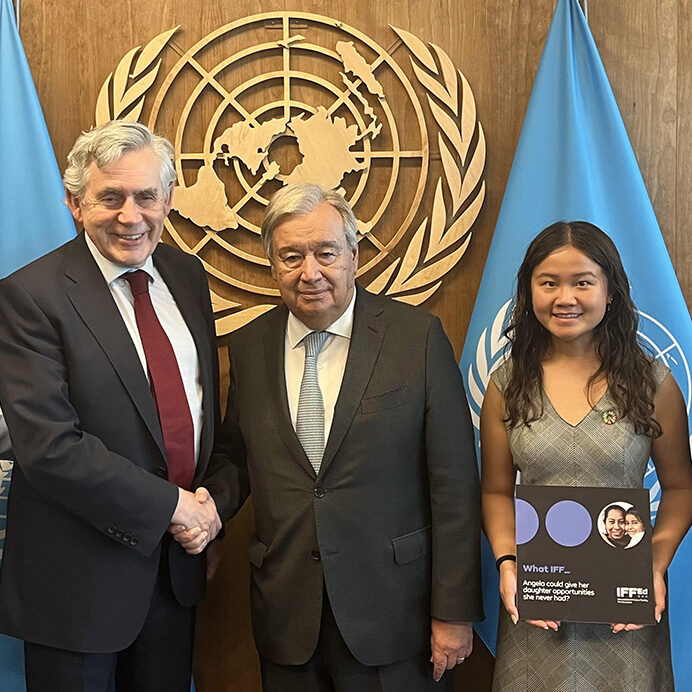UN Special Envoy for Global Education and Education Commission Chair Gordon Brown delivered the following remarks at the Transforming Financing for Education session during the Transforming Education Pre-Summit in Paris on June 29, 2022. This high-level panel examined the urgent shift in domestic and international financing needed to drive education transformation.
Photo: Liesbet Steer/Education Commission
Let me first of all thank the United Nations and UNESCO for organizing this pre-Summit, and all those participating in this conference. Even though I am at a distance from you, I feel very close to all those who are advocating universal education so that we should become the first generation in history where every child can go to school.
Whenever there is a child not at school – forced out of school by early marriage, forced out of school to be in child labor, or child trafficked… all these children – they deserve our support because what they need most of all is the right to an education.
I’m going to be very blunt, with 300 million children now not going to school, 800 million leaving school without qualifications. Seventy percent of children not meeting learning standards at the age of 11, and 70% in the poorest continents not leaving with anything that can help them in the workforce they want to enter.
We need a fundamental shift.
It’s got to be radical. It’s got to be irreversible. Business as usual does not give us the answers, so I’m proposing far more radical change.
First, I agree domestic resource mobilization is absolutely critical. To that is the efficient use of resources when we mobilize resources in each of our countries. The aims are right, 4-6% of GDP, 15-20% of public spending.
Achieving that by getting taxation and the avoidance of tax tackled in each country.
Debt restructuring. I was part of the debt relief that gave 40 countries nearly $200 billion in debt relief in 2005.
We need that kind of debt restructuring immediately and I am sad that the G7 should have met without agreeing that it was going to make sure that happened.
All these things need to happen.
But there is no guarantee that if that happened, that the money would go to education. We’ve got to fight for it.
And it will not be enough to deal with the crisis we face now, particularly when 40% of countries are cutting their education budgets.
We need internationally to do far more to help countries spend and invest in education and we need international action collectively. And that’s why we are proposing a Global Compact for Education Financing.
What does that mean?
It means first of all 15% of aid must go to education, but countries must honor their promises on aid, because one by one countries are reducing aid at the moment and we’ve got to fight that.
Secondly, and I will be very blunt about the World Bank. More has got to be spent in IDA on education. It’s only 11% at the moment, it should be 15%. We believe that an enhanced IDA that is $125 billion over three years, the next cycle, and 15% on education could raise an additional $10 billion of resources for the 200 million children in low-income countries who deserve that support. That is something that I think we should argue for and agree at the Transforming Education Summit in September.
The third is that we require a new institution. Nobody has yet talked about the financing needs of middle-income countries and lower-middle-income countries. That’s where the biggest number of out-of-school children are now. That’s where the biggest group of refugees and displaced people are now. There are 700 million children in total.
Now the World Bank’s facility for middle-income countries provides only 6% of its resources to education and the reasons is that it’s structured in such a way that it’s more convenient for finance ministers to spend on infrastructure and transport than on educating children. That’s why we need the new facility which is called IFFEd – the International Finance Facility for Education. And this morning the Asian Development Bank made it clear that it is going to work through IFFEd so that it can release 10% of its resources initially to education. And that’s what we want every development bank to consider doing.
Why is it such a good facility?
Because at the moment we deal with loans and grants. These facilities I am talking about in any development bank would be built on guarantees. Countries can give guarantees without them having to be on their balance sheets in the European Union, and that’s why Sweden, that’s why the Netherlands, and that’s why the United Kingdom are preparing to do this.
What it means is that there is low-cost finance for lower-middle-income countries who are trying to do something on education. And the leverage that is offered is far greater than anything the World Bank at the moment is able to offer these lower-middle-income countries.
So I tell you if we do not agree to a new Facility which has been asked for by the Secretary- General of the United Nations in his summary of what he wants out of this conference then we will lose the chance of what I think is potentially $10 billion of new resources to help the 700 million children that we are talking about.
I’ve heard all the views from young people in advance of this conference.
I want to learn, they keep telling me.
I don’t want to be out of school, let me learn.
I don’t want to be a child bride, let me learn.
I don’t want to be suffering from child labor, let me learn.
I want to have a fair chance, let me learn.
Now the one way we can give them a fair chance is by honoring the promise that we will deliver this Sustainable Development Goal of quality education for all and we have got to do it by providing new resources internationally to enable those countries who are struggling to develop and deliver education at the moment.
We can be the first generation in history where every child goes to school.
We can develop the potential of every child and not just some children.
But we’ve got to do this in September by making the Transforming Education Summit transformational for education itself.



